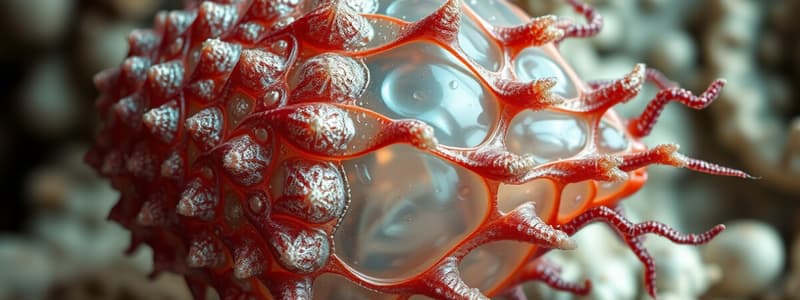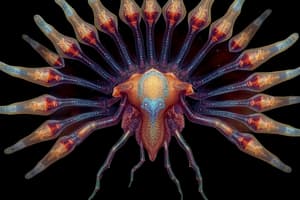Podcast
Questions and Answers
What are Polyplacophora habitats?
What are Polyplacophora habitats?
Hard, rocky substrates usually close to shore
The class Polyplacophora has a distinctive external shell with 8 dorsal ______ _____.
The class Polyplacophora has a distinctive external shell with 8 dorsal ______ _____.
calcareous plates
What is the ventral holdfast of class Polyplacophora?
What is the ventral holdfast of class Polyplacophora?
Oval body with a flat muscular foot
Class Polyplacophora's thick lateral mantle forms a girdle and later grooves house ______.
Class Polyplacophora's thick lateral mantle forms a girdle and later grooves house ______.
What is the diet of class Polyplacophora?
What is the diet of class Polyplacophora?
Who are the predators of class Polyplacophora?
Who are the predators of class Polyplacophora?
Chiton's defense is heavy overlapping _______.
Chiton's defense is heavy overlapping _______.
Chiton's defense ability to curl into a _____.
Chiton's defense ability to curl into a _____.
Chiton's defense strong attachment can be ______.
Chiton's defense strong attachment can be ______.
Class Polyplacophora are _______ species with external fertilization.
Class Polyplacophora are _______ species with external fertilization.
Class Polyplacophora males always release sperm into the ____.
Class Polyplacophora males always release sperm into the ____.
Class Polyplacophora females release single eggs or stirrings or masses of ____.
Class Polyplacophora females release single eggs or stirrings or masses of ____.
Class Polyplacophora hatches to release a free-swimming _______.
Class Polyplacophora hatches to release a free-swimming _______.
Flashcards are hidden until you start studying
Study Notes
Habitat
- Polyplacophora typically inhabit hard, rocky substrates near shoreline environments.
Shell Structure
- The class features a distinctive external shell composed of eight dorsal calcareous plates.
Body and Locomotion
- Chitons possess an oval body equipped with a flat, muscular foot that serves as a ventral holdfast.
Mantle and Gills
- A thick lateral mantle forms a girdle and contains grooves that house ctenidia for respiration.
Feeding Habits
- Chitons primarily scrape algae and small invertebrates as part of their diet.
Predation
- Polyplacophora face predation from various invertebrates and vertebrates.
Defense Mechanisms
- Chitons utilize heavy overlapping shell plates as a primary defense against predators.
- They can curl into a ball for added protection when threatened.
- Their strong attachment allows them to be picked up without dislodging.
Reproductive Characteristics
- Members of this class are dioecious, meaning they have distinct male and female individuals with external fertilization.
- Males release sperm into the sea, while females release either single eggs or jelly-like masses.
Larval Development
- The fertilized eggs hatch into free-swimming trochophore larvae, which are part of the early developmental stage.
Studying That Suits You
Use AI to generate personalized quizzes and flashcards to suit your learning preferences.



